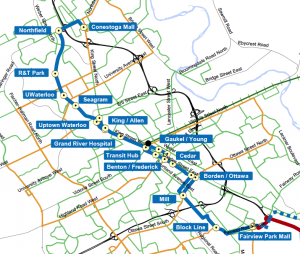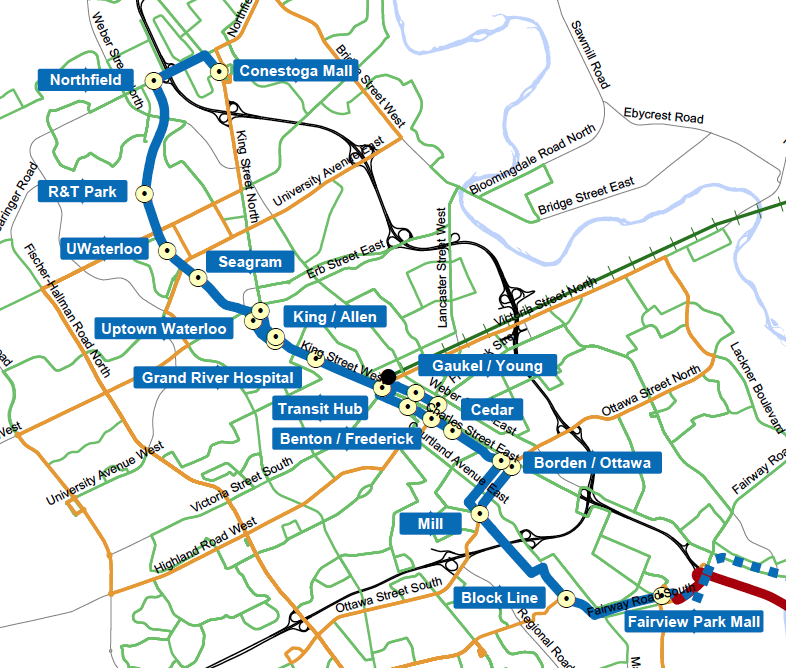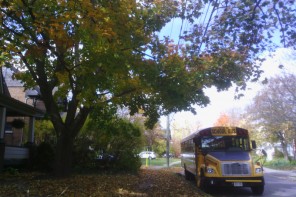 How will the LRT affect Kitchener Waterloo’s property values?
How will the LRT affect Kitchener Waterloo’s property values?
I always advise my clients to buy a home in a good school zone (Rule #91). Not only do homes near good schools appreciate at a better than average rate in relation to homes in other neighbourhoods, school ranking is also correlated to crime rate (good school = low crime, bad school = high crime).
Read: 365 Rules about Real Estate
With the construction of the LRT, I recommend to all of my clients that they consider buying along the future LRT line. I’ve been operating under the assumption that this huge addition to the Waterloo Region’s mass transit system will increase property values nearby. I base my assumption on the fact that I lived in Taipei during the construction and opening of the MRT and I witnessed firsthand how property values were impacted – my in-laws sold their home for much more than I could have imagined a few years before. I’ve also spent some time in Vancouver, visited several condo and townhouse sites along the Skytrain lines and saw again how a great public transportation system can impact neighborhoods.
The LRT will affect property values in three somewhat different ways, one negative and two positive.
First, the negative. There will be increased noise from the trains and increased pedestrian traffic which may reduce residential property values very close to transit stations or along the transit line. There will also be increased parking congestion near stations. Some studies show being within 300 meters of a station can have a negative impact on property values.
Second, there is an economic transfer that gives one location a relative advantage over other locations, attracting residential and commercial development that would otherwise occur elsewhere in the region. This means one area gains at the cost of another; a sum zero gain.
Third, availably of transit also increases overall productivity by reducing total transportation costs for vehicles, parking and roads and providing a catalyst for more clustered development patterns that provide economies of conglomeration, which can reduce the costs of providing public services and increase productivity and improve accessibility and network effects. Although these productivity benefits are difficult to quantify, they can be large: just a few percent increase in property value, a few percent reduction of parking costs, or few percent increase in business productivity in a community and total hundreds of millions of dollars. This means that the LRT is good for Waterloo Region as a whole.
But what about house values?
There have been several case studies. The data clearly shows that property values near a rail station are impacted (positively) to a much greater degree than those farther away. Property values in Washington DC, Atlanta, San Francisco, New York, Boston, Los Angeles, Philadelphia, Santa Clara County, Portland, and San Diego all increased by being located near transit stations.
Early Research
Research about the relationship between transportation systems and housing prices goes back to 1846 to a survey conducted to determine the impact of London’s rail lines on poor, working class districts of the city. It found that weekly and monthly rents in districts along the train lines rose from 10% to 25% as result of their proximity to public transit stations.
More Research
Studies from the United States and Canada have generally shown a positive average relationship between proximity to transit stations and neighboring housing values:
United States House of Representatives (1981) reveals a $12,300 premium paid for town homes located within 1,000 feet of a Washington D.C. Metro station
Another study (Bajic 1983) shows an increase of $2,237 for homes in Toronto’s Spading neighborhood, which were near subway stations
(Votive 1993) reports an increase of 6.4% for homes near Philadelphia’s train stations
(Armstrong 1994) finds a housing price premium of 6.7% for suburban Boston communities with commuter rail stations
(Landis 1995) find that home prices decline $1–$2 per meter distance from a Bay Area Rapid Transit (BART) station in California
(Benjamin and Sirmans 1996) reports a decrease of 2.4% to 2.6% in housing price for every tenth of a mile from a Washington D.C. Metro station
(Workman and Brod 1997) examines individual San Francisco neighborhoods and finds a decline of $2,300 in home prices for every 100 feet from a BART station in one neighborhood and $1,578 for every 100 feet in another
(Sedway Group 1999) reports a decline in housing price of $74 per foot from a BART station within the first quarter of a mile and $30 per foot for those greater than a quarter of a mile away
(Baum-Snow and Kahn 2001), a multi-city study analysis, finds that moving from three miles to one mile away from a transit station creates a rent increase of $19 per month and a housing premium of $4,972; and
(Garrett 2004), a study on the Metrolink in St. Louis, shows an increases of $140 in home price per 10 feet closer to a station.
Timing
Both the positive and negative impacts of transit systems can vary through time. One study of Chicago’s Midway line revealed that, in the three years before its construction, the Midway Line increased values of homes within a half mile of proposed stations by 17%. A follow-up study showed that, from announcement in 1983 to 1987, the proposed Midway Line increased home values within a half mile by 4.2%, from 1991 to construction in 1996, it increased home values by 19.4%, but, then, post-construction, from 1997 to1999, home values fell 9.8% within that same half mile distance. The post-construction drop was attributed to both the realization of negative externalities and the potential deflation of what was believed to be an artificially strong market in those areas surrounding the transit stations.
Another study showed similar increases of 31% within a half-mile radius and 10% within a half- to one-mile radius in an analysis of vacant parcels surrounding the proposed Westside expansion of the MAX light rail system in Portland, Oregon.
It seems pretty clear from the data above that living near a LRT station will increase your property value by perhaps 10% if you are within 2 kilometers (25 minute walk) and by considerably more if you are within one kilometer (12 minute walk).
Hedge against the economy
There was recently another study that found proximity to mass transit has a positive effect on property values. During the last economic recession (in the US), residential property values performed 41% better, on average, if they were located near public transportation with high-frequency service. This is referred to as a “transit premium”. The study looked at the effects of cities across the U.S. between 2006 and 2011, when residential property values in the U.S. declined substantially, and found that properties close to public transit showed “significantly stronger resiliency.” The study found that residents close to the Chicago Transit Authority also saw average residential property sales perform 47.3% better than the rest of the Chicago region, while average sales prices for residential properties in the Chicago region declined by nearly one-third between 2006 and 2011.
My advice:
Buy a home near a future LRT station — within two kilometers is good, one kilometer is better. The areas that are best effected by the LRT are neighbourhoods in the cores of Waterloo and Kitchener (Uptown, Westmount, near the Grand River Hospital, Victoria Park, Civic District, East Ward…). On the high end, Colonial Acres (near the Conestoga Mall) always a good buy just got better and on the low end, the Kingsdale neighbourhood (near the Fairview Park Mall) will improve greatly in value with the access to the LRT.
 Please contact me if you are relocating to Waterloo Region or moving within the region.
Please contact me if you are relocating to Waterloo Region or moving within the region.
Read: How much does it cost to live within a ten minute walk to a LRT Stop?
Stay up to date with what’s happening in Kitchener Waterloo at the Kitchener-Waterloo Real Estate News






Hi Keith;
Still contemplating whether to buy in Canada and need to have the family see Kitchener area. I know if I wait too long I may miss the deals.
I will be back again this year and will contact you.